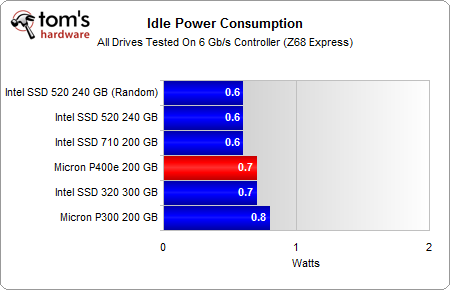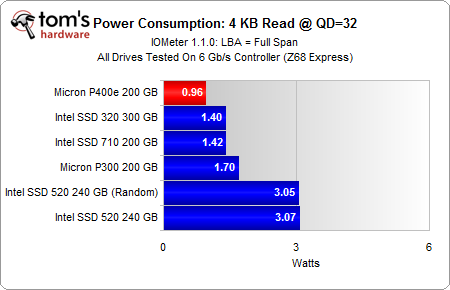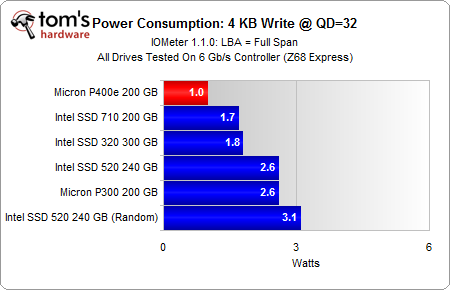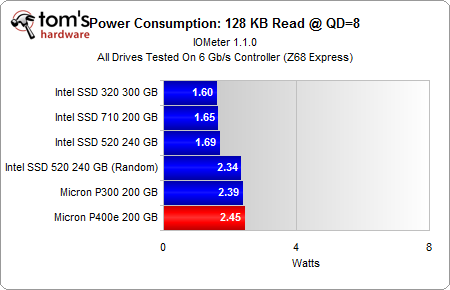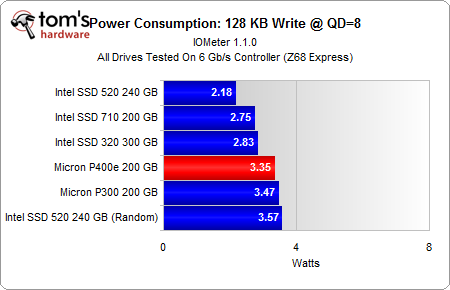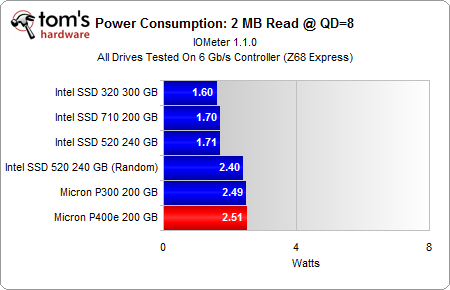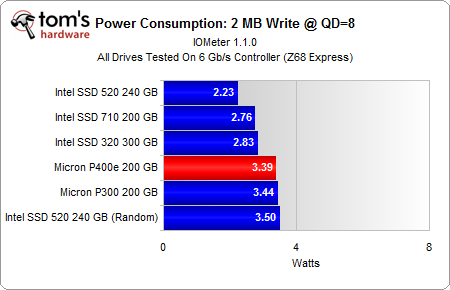Micron's RealSSD P400e: Affordable SSD Storage For The Enterprise?
Power Consumption
Although it's often true that enterprise-class drives are subjected to 24x7 workloads, that's not always the case. When these SSDs are idling, they're all using less than 1 W.
Although Micron's P400e delivers very bad steady-state random read performance, it at least draws the least amount of power in the process.
Meanwhile, Intel's SSD 320 does well, delivering 9x more performance at a queue depth of 32, yet only consuming 45% more power.
The efficiency of Micron's P400e is more impressive in 4 KB random writes, where it not only beats the SSD 320, but also uses less power than the Intel desktop drive.
Unfortunately, if you consider the SSD 710 as well, the more enterprise-specific model serves up two times as much performance at 70% more power.
Switching to sequential accesses, the P400e consumes slightly more power to achieve its performance edge over the SLC-based P300. However, this 0.06 W difference is really inconsequential considering both SSDs achieve around ~450 MB/s.
Intel's SSD 520 is the more energy-efficient option; it delivers greater performance and consumes less power.
Get Tom's Hardware's best news and in-depth reviews, straight to your inbox.
The P400e nearly catches the performance of Intel's SSD 520 at a queue depth of eight when the SandForce-based model is made to juggle incompressible data. So long as you limit you scope to that comparison, Micron's new offering is more efficient because it consumes less power than the SSD 520 to achieve similar performance.
Larger block sizes have little impact on power consumption. At a queue depth of eight, 128 KB and 2 MB performance and efficiency are roughly the same.
Current page: Power Consumption
Prev Page 128 KB And 2 MB Sequential Performance Next Page Enterprise Workload Performance-
ethanolson I wonder if the poor performance is part of some mechanism that ensure higher reliability. Maybe lower read and write voltage increase endurance but take longer to populate the cell with the appropriate charge level.Reply
Just sayin'. -
mayankleoboy1 ReplyRelease Date: 04/11/2012
Firmware for the m4 SSD is being updated from version 0309 to 000F. The m4 is updatable to this new firmware starting from versions 0001, 0002, 0009, or 0309 in a single step. If updating from an early version directly to 000F, all interim improvements will also be include.
Changes between version 0309 and 000F include the following changes:
Improved compatibility with certain SAS expanders and peripheral RAID cards.
Improved throughput stability under extremely heavy workloads.
Improved data protection in the event of unexpected, asynchronous power loss.
This firmware update is recommended for all drives currently in the field if the end user is experiencing any of these symptoms.
m4 firmware updated to a newer version. -
jaquith Seems like the perfect SSD for a third-rate data center and not mine.Reply
If SoftLayer (f/k/a ThePlanet) wants to lower their standards then good for them, and perhaps they need yet another law suit or reevaluate their published up-time with some more asterix *. -
lutel The only thing that is important for me is full disk encryption in desktop environment. Unfortunately Intel completly forgot and since Q66 chipset there is no mainboard supporting FDE with SSDs. Q77 probably could support it, but there is no BIOS that has "hard disk / ATA password" option. Intel, wake up!!!Reply -
cknobman Not impressed at all. I dont really see one redeeming feature this drive has that would get it chosen over many other SSD's on the market.Reply -
Is it just me or do I notice that we really need to SAVE SLC from extinction? I mean, naturally high performance (compression or none), better temperature control, and higher longevity are the greatest features of SLC - good for the environment, pocketbooks, and peace of mind long term. Anyone?Reply
